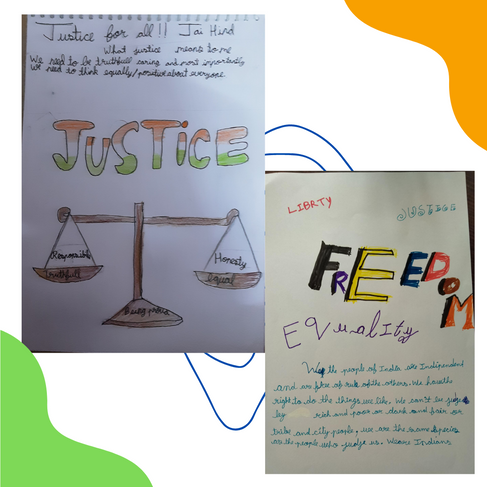What does the Constitution mean to us?We the Children of India
- JoAnne Saldanha
- Jan 28, 2022
- 3 min read
When I ask my students about Republic Day, they all have the right answers.
They all know that it was the day the Constitution of India came into effect. Some throw in the right year, a few mention Dr. Ambedkar, while quite a few know that it outlines the ‘laws and rules’ by which India is governed.
This week, we explored two classics with my students in the build up to Republic Day.
‘WE THE CHILDREN OF INDIA - The Preamble to our Constitution’ by Leila Seth and ‘THE BOY WHO ASKED WHY’ by Sowmya Rajendran.

As I read out extracts from We the Children of India during our online library session, the children sent out heart emoji’s, thumbs up emoji’s and expressed a big thank you to me for reading it to them. They commented on how ‘awesome’ it was of that Justice Leila Seth wanted children to understand the constitution and they wanted to thank her for writing this book. They felt that she ‘saw’ them and valued them enough to write a book explaining something they must know.
I was a absolutely gob-smacked with this reaction, especially since I was wondering how they would react to a non-fiction read.
They shared that while they had heard the preamble before, no one had taken the time to explain the meaning of each term/ideal to them.
I often question the practice to get children to parrot facts, say all the right things, but not understand the meaning of what they are learning. What is the point of having children 'draw' a picture of the flag or the national symbols on Republic day? What meaning do they hold if they cannot understand what our constitution stands for?
These explorations and space to express thoughts needs to happen in every classroom, if not, the library offers the perfect space to do so.
It does require preparation and reflection by the adult involve, be it a teacher, a parent or a librarian, but the effort is so worth it, when you see the little spark ignite.
Republic day offers us the opportunity to help children delve into the meaning of the constitution, what is it that we need to uphold.
It offers us a chance with older children, to discuss whether they feel these ideals are being upheld today. Give them the space, keep an open mind, offer them the respect that they sharing demands.
Since I was working with grades 5,6 and 7 last week, we discussed every term from ‘WE THE PEOPLE’, to the meaning of SOVEREIGN, SOCIALIST, SECULAR, DEMOCRATIC REPUBLIC, JUSTICE, LIBERTY, EQUALITY and FRATERNITY.
The children responded by reflecting on what each term means to them and making a little poster on one of the terms that stood our for them or held particular meaning for them.
Justice and Equality were terms that seemed to hold particular interest, especially with my grades 5 and 6.
This so reflects their age and their development phase. Elementary age children have an increased sense of justice and moral order.
My grade 7’s could appreciate the ideas of secularity and fraternity and how beautifully they expressed themselves as they explored the terms of the preamble, in their posters.
I am so proud of the thought that went into some of these posters.
I plan to draw on this interest in the ideals held in our constitution through a series of books and stories. The books in the images below, offer me just the right prompts to discuss the meaning of these terms and to start dialogues around whether these ideals as outlined by our constitution are being upheld today.
While my younger group, or 2nd-4th graders, were inspired by the life of Dr.Ambedkar, the father of the Indian constitution, as outlined sensitively by Sowmya Rajendran in The Boy Who Asked Why.
Do repost, share or save if you find these suggestions useful.
Book suggestions featured above:
Bhimayana by Subash Vyam...a Graphic novel (Navayana)
The Boy who Asked Why by Sowmya Rajendran (Tulika)
Shaheen Bagh: A Graphic Recollection by Ita Mehrotra (Yoda Press)
Nida Finds A Way by Samina Mishra (Duckbill)
One World (Tulika)
Turning the Pot, Tilling the Land by Kancha Illaiah (Navayana)
The Rain by Swati Raje
Uncle Nehru Please Send and Elephant by Devika Cariapa (Tulika)
We the Children of India by Leila Seth (Penguin India)



























Wonderful to see how students responded! As you said, we need to respect their ability to understand concepts that are so fundamental to all our lives. Growing citizens! Very helpful selection of titles.